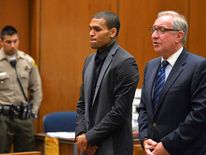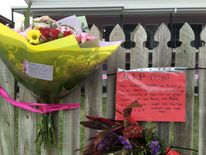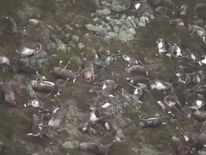Theresa May has said the UK must focus on the "opportunities" on offer outside the EU as she reiterated there would be no second referendum on Brexit.
The prime minister is meeting cabinet colleagues at Chequers to discuss developments since June's Leave vote.
She told them that the UK would not stay in the EU "by the back door" and she was committed to making a success of Britain's "new role" in the world.
Mrs May has said talks with the rest of the EU will not begin this year.
The meeting at the PM's country residence is being billed as the most significant since the referendum vote in June and comes amid reports of tensions and diverging priorities among key figures in the Cabinet charged with implementing the UK's exit.
Brexit Watch: At-a-glance briefingBrexit: All you need to knowThe Brexit to-do listBBC political correspondent Tom Bateman said Mrs May had asked every Cabinet minister before the summer break to identify what were described as the "opportunities" for their departments and they will now be expected to report back.
In comments made at the start of the meeting while cameras were allowed in, Mrs May told ministers that the government was clear that "Brexit means Brexit".
"We will be looking at the next steps that we need to take and we will also be looking at the opportunities that are now open to us as we forge a new role for the UK in the world," she said.
"We must be clear that we are going to make a success of it - that means no second referendum, no attempts to sort of stay in the EU by the back door. That we are actually going to deliver on it."
The prime minister has said the UK government will not trigger Article 50 - the official mechanism for beginning the process of leaving the EU - until the start of 2017 at the earliest.
From that moment, discussions over the terms of the UK's exit will conclude in two years unless all 28 members of the EU agree to extend them.
The UK voted to leave the EU, by a margin of 51.9% to 48.1%, in a referendum on 23 June and Mrs May, who had backed staying in the EU, became prime minister after David Cameron resigned in its aftermath.
Two months on from the vote, the relationship the UK will have with the EU after its exit, in terms of access to the EU internal market and obligations in regard to freedom of movement, remains unclear.
Former Foreign Office Minister Hugo Swire said there was a "definite fault line" between ministers who believed Brexit was chiefly about ending free movement and those who wanted to see more "flexibility", meaning the UK did not yet have its "ducks in a row" for negotiations.
Mr Swire, who campaigned for Remain, told BBC Radio 4's The World at One: "Until we have a clear idea of what it is that we are trying to achieve... I think we should proceed with great caution."
Wednesday's meeting at the prime minister's country residence is being seen as an opportunity for Mrs May and senior colleagues to talk through many issues involved ahead of this weekend's summit of G20 leaders in China.
The talks are being billed as the most significant since the referendum result and mark an end to the relative lull in proceedings over the summer recess - which ends on Monday.
Mrs May, who has held face-to-face talks with the leaders of Germany, France, Italy, Ireland, Poland and Slovakia since taking office, has said time is needed to determine the UK's strategy as a "sensible and orderly departure" is in the national interest.
But several senior Conservatives have warned against undue delay and said nothing should stand in the way of the UK triggering Article 50 as soon as possible next year.
Ex-Chancellor Lord Lawson, a leading Leave campaigner, said the UK should not try to negotiate a special trade deal with the EU, allowing it to remain within the single market, because it simply wasn't on offer on acceptable terms and would hold the process up.
"As soon as you stop wasting time trying to negotiate the unnegotiable - some special trade deal with the EU - it is possible to have a relatively quick exit," he told BBC Radio 4's Today.
"A prolonged period of uncertainty is bad for the economy and for British business. The sooner this is sorted out the better."
Brexit-backing backbencher Jacob Rees-Mogg agreed, telling BBC Radio 4's World at One leaving the EU was "the simple bit" and that trade negotiations could take place afterwards.
Among those round the table with Mrs May are Foreign Secretary Boris Johnson, International Trade Secretary Liam Fox and David Davis, Secretary of State for Exiting the European Union.
Mr Johnson, Mr Fox and Mr Davis are reported to have held private talks last week amid reports of early disagreements over the shape of a future Brexit settlement and departmental responsibility for trade issues.
Former Conservative minister Anna Soubry, who backed the UK remaining in the EU, said it was now up to the "three Brexiteers" to deliver the best deal for the British people.
"Boris Johnson, Liam Fox and David Davis - these are the people that have to show us the progress they have made, what Brexit is beginning to look like, what successes, difficulties or failures they have had," she told Today.
'Nods and winks'
Although she accepted the outcome of the referendum, Ms Soubry said she did not accept the British people had voted, in and of itself, for a cut in immigration or curbs on the right of EU citizens to live and work in the UK and more debate was needed.
Labour's Jon Ashworth said what was needed was a detailed statement on the work that had been done so far rather than brainstorming meetings and "nods and winks" on issues such as immigration.
The SNP, meanwhile, has accused the government of "breathtaking complacency" over a plan for Brexit and "making it up as they go along".
Although MPs will have a say on the timing of talks there was no legal requirement to consult Parliament before Article 50 was activated, No 10 has said.
Chequers, an isolated 16th Century mansion 40 miles north-west of London, has played host to a number of historic occasions in the past 50 years and was one of Margaret Thatcher's favourite locations to conduct high-level meetings and personal diplomacy.







